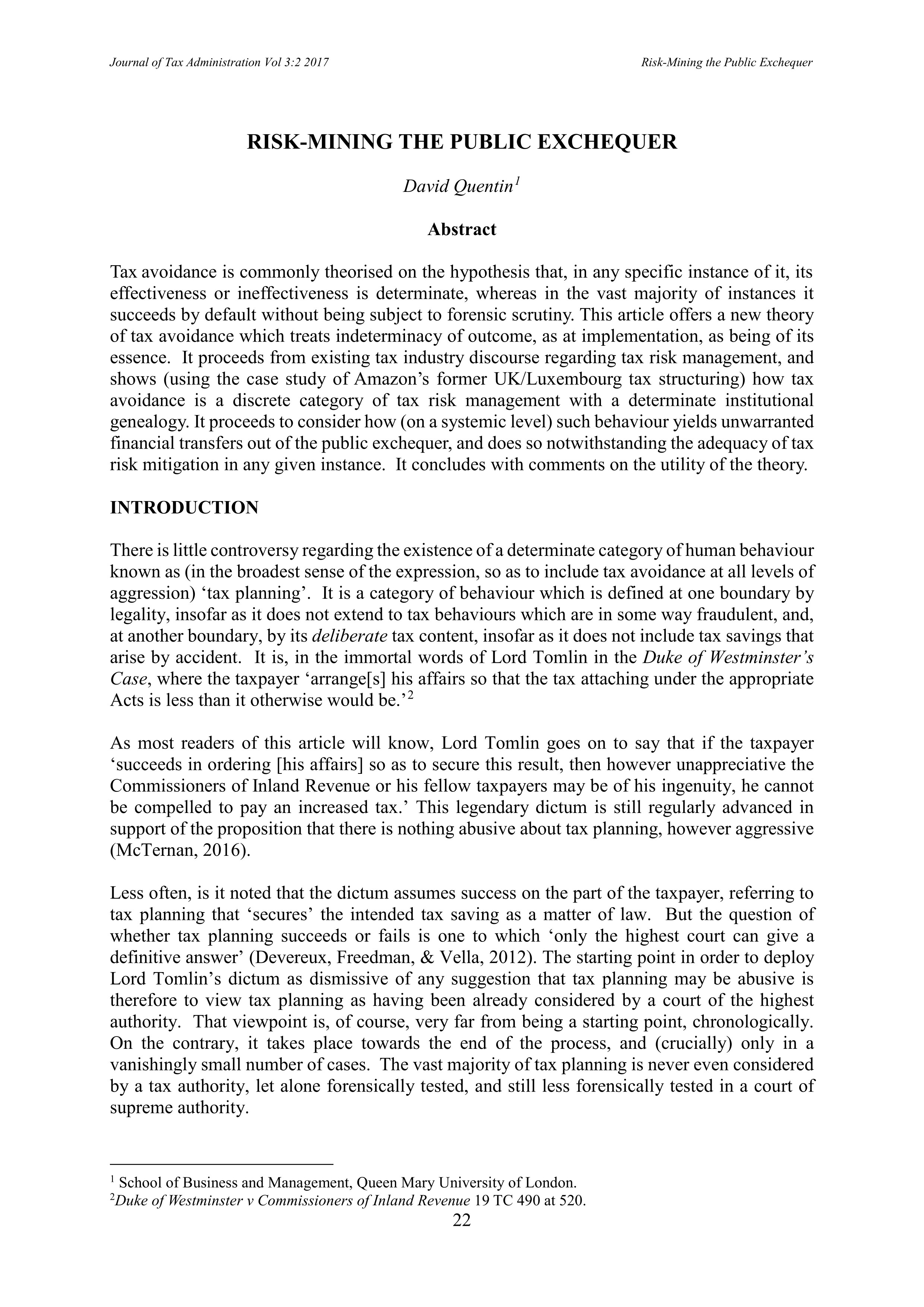Risk-Mining the Public Exchequer
Abstract
Tax avoidance is commonly theorised on the hypothesis that, in any specific instance of it, its effectiveness or ineffectiveness is determinate, whereas in the vast majority of instances it succeeds by default without being subject to forensic scrutiny. This article offers a new theory of tax avoidance which treats indeterminacy of outcome, as at implementation, as being of its essence. It proceeds from existing tax industry discourse regarding tax risk management, and shows (using the case study of Amazon’s former UK/Luxembourg tax structuring) how tax avoidance is a discrete category of tax risk management with a determinate institutional genealogy. It proceeds to consider how (on a systemic level) such behaviour yields unwarranted financial transfers out of the public exchequer, and does so notwithstanding the adequacy of tax risk mitigation in any given instance. It concludes with comments on the utility of the theory.
References
CASES CITED
Brooke v Bool [1928] 2 KB 578
Cosmetic Warriors Ltd & Anor v amazon.co.uk Ltd & Anor [2014] EWHC 181 (Ch)
Duke of Westminster v Commissioners of Inland Revenue 19 TC 490
Flanagan and others v Revenue and Customs Commissioners [2014] SFTD 881; [2014] UKFTT 175 (TC)
Peterson Farms Inc v C&M Farming Ltd [2004] 1 Lloyd’s rep 603
WT Ramsay Ltd v IRC [1979] STC 582
LEGISLATION CITED
Part 7 Finance Act 2004
Schedule 43C Finance Act 2013
Part 4 Finance Act 2014
REFERENCES
Bergin, T. (2013, May 17). After Google, Amazon to be grilled on UK tax presence. Reuters. Retrieved from https://web.archive.org/web/20170624063520/http://www.reuters.com/article/net-us-britain-tax-amazon-idUSBRE94G06220130517
BP. (2016) BP’s Approach to Tax’. Retrieved from https://web.archive.org/web/20170624095940/http://www.bp.com/content/dam/bp/pdf/sustainability/group-reports/bp-approach-to-tax.pdf
Bracco, G., & Gooding, R. (2016, June 13). Tax risk: Why tax and risk need to speak the same language [Blog post]. Retrieved from https://web.archive.org/web/20170315202409/http://pwc.blogs.com/fsrr/2016/06/tax-risk-why-tax-and-risk-need-to-speak-the-same-language.html
de Mik, B. (2010). Introduction to tax risk management. In A. Bakker & S. Kloosterhof (Eds.), Tax Risk Management: From Risk to Opportunity, (pp. 1-17). Amsterdam: IBFD.
Devereux, M., Freedman, J., & Vella, J. (2012). Tax Avoidance. Oxford: Oxford University Centre for Business Taxation. Retrieved from https://web.archive.org/web/20170624062936/https://www.sbs.ox.ac.uk/sites/default/files/Business_Taxation/Docs/Publications/Reports/TA_3_12_12.pdf
European Commission (2014). C(2014) 7156 final, State aid SA.38944 (2014/C) Brussels: European Commission.. Retrieved from https://web.archive.org/web/20170624065425/http://ec.europa.eu/competition/state_aid/cases/254685/254685_1614265_70_2.pdf
HM Revenue & Customs. Litigation and Settlement Strategy. London: HMRC. Retrieved from https://web.archive.org/web/20170620155741/https://www.gov.uk/government/uploads/system/uploads/attachment_data/file/387743/Litigation_and_settlement_strategy.pdf
Hoyng, R., Kloosterhof, S., & Macpherson, A. (2010). Tax Control Framework. In A. Bakker & S. Kloosterhof (Eds.), Tax Risk Management: From Risk to Opportunity, (pp.19-70). Amsterdam: IBFD.
Marian, Omri Y. (2017) The State Administration of International Tax Avoidance. Harvard Business Law Review, 7(1); UC Irvine School of Law Research Paper No. 2015-95. doi:10.2139/ssrn.2685642
McTernan, J. (2016, April 5). Tax avoidance is an expression of basic British freedoms. The Telegraph. . Retrieved from https://web.archive.org/web/20170624062235/http://www.telegraph.co.uk/news/2016/04/05/tax-avoidance-is-an-expression-of-basic-british-freedoms/
OECD. (2011). Guidelines for Multinationals. Paris: OECD Publishing. Retrieved from https://web.archive.org/web/20170624095705/http://www.oecd.org/daf/inv/mne/48004323.pdf
Quentin, D. (2014, August). Risk-mining the public exchequer. Retrieved from https://web.archive.org/web/20170624063115/http://www.davidquentin.co.uk/Risk-Mining_The_Public_Exchequer.pdf
UK Parliament Public Accounts Committee. (2012). HM Revenue and Customs: Annual Report and Accounts, 2012. Retrieved from https://web.archive.org/web/20170624063345/https://www.publications.parliament.uk/pa/cm201213/cmselect/cmpubacc/716/71605.htm

Downloads
Published
How to Cite
Issue
Section
License
Copyright (c) 2017 David Quentin

This work is licensed under a Creative Commons Attribution 4.0 International License.
Our open access status means that authors retain the copyright of their work. However, all papers published in JOTA are done so under a Creative Commons Attribution 4.0 International license (CC BY). This means that others can share and/or adapt your work without your permission as long as they follow certain rules, including attributing your work correctly.
You can learn more about this on our Open Access, Licensing, and Copyright Policies page.



